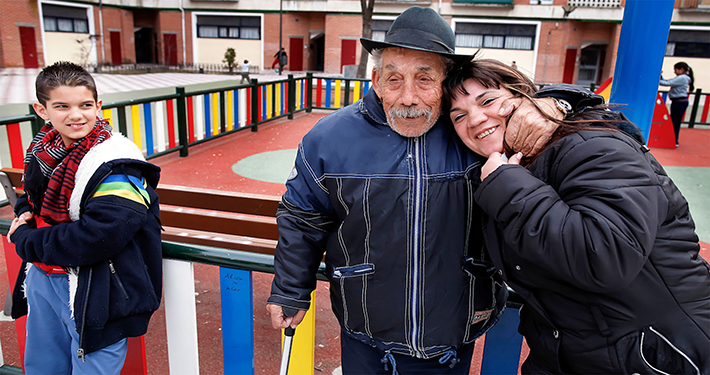
Pension
Pensionering fra lønnet arbejde i en alder af 65 år og ofte tidligere har været normen i EU indtil de seneste år. Der er forskel på, hvornår folk går på pension rundt om i EU's medlemsstater, og pensionsalderen har været stigende.



Efterhånden som den store efterkrigsgeneration begynder at gå på pension, vil flere arbejdstagere gå på pension, end der kommer nye ud på arbejdsmarkedet. Når folk lever længere, og fødselstallet er faldende i hele Europa, er et af prioriteterne i EU-politikkerne at tilskynde europæerne til at blive ved med at arbejde længere for at sikre bæredygtighed i pensionssystemerne og tilstrækkelig social sikring. I de senere år har nogle medlemsstater hævet folkepensionsalderen (f.eks. Irland til 68 år i 2028 og Tyskland til 67 år i 2031) og forsøgt at finde metoder til at tilskynde arbejdstagerne til at blive længere på arbejdsmarkedet. Mange ældre arbejdstagere ønsker også i stigende grad at fortsætte længere med at arbejde.
Europa-Kommissionens hvidbog om pensioner fra 2012 indeholder forslag til initiativer, der skal skabe en ramme, så ældre arbejdstagere kan forblive på arbejdsmarkedet og spare op til deres pension. Man opfordrede også medlemsstaterne til at fjerne forskellene i den lovbestemte pensionsalder mellem mænd og kvinder og til at revidere uberettigede obligatoriske pensionsaldre. Kommissionen har også gennemgået pensionsordninger for arbejdstagere i anstrengende eller farlige job i Europa og drøftet igangværende reformer og bedste praksis med anbefalinger til EU- medlemsstaterne.
I årenes løb har Eurofound analyseret spørgsmål vedrørende pension i EU-landene. Forskningen har set på mulighederne for tidlig pension og gradvis pension, muligheder for at kombinere arbejde med delvis pension, arbejde efter pensioneringen, frivilligt arbejde for pensionister og problemer med pension. I de senere år har forskningen været fokuseret på at forlænge arbejdslivet ud over den nuværende pensionsalder samt spørgsmål om præferencer vedrørende arbejdet, indkomst og livskvalitet.
I en analyse af resultaterne af Eurofounds tredje europæiske livskvalitetsundersøgelse ses der nærmere på ældre arbejdstageres præferencer med hensyn til arbejdstider. Det fremgår, at næsten halvdelen af arbejdstagerne på 50 år og derover ville foretrække at arbejde færre timer under hensyntagen til deres økonomiske behov. En betydelig andel af de pensionister, der ikke i øjeblikket har lønnet arbejde, vil rent faktisk gerne arbejde i det mindste et par timer om ugen. Forskerne har også undersøgt, hvordan evalueringer midtvejs i karrieren kan bidrage til at præcisere arbejdstagernes muligheder for at forblive på arbejdsmarkedet indtil en senere pensionsalder.
I dag forlader ældre arbejdstagere ofte arbejdsstyrken inden den lovbestemte pensionsalder på grund af sundhedsproblemer, handicap og plejeforpligtelser. Mange flere mennesker ønsker ganske enkelt at arbejde mindre og tilpasser deres arbejdstid bedre til deres præferencer. En af måderne at motivere og give folk mulighed for at arbejde længere er at gøre det lettere at gå på nedsat tid, idet man udligner indtægtstabet med en delvis pension eller ydelse. I en undersøgelse fra Eurofound kigger man på virkningerne ved sådanne ordninger med delvis pension.
I mange lande har ældre mennesker lønnet beskæftigelse efter pensionsalderen. I Eurofounds undersøgelse om indkomst fra arbejde efter pensionsalderen i EU ses der nærmere på pensionisternes begrundelser for at søge lønnet arbejde og deres beskæftigelsesmuligheder. Den undersøger virksomhedernes strategier for rekruttering og fastholdelse af pensionister og fremhæver dilemmaer og fordele for ældre, der ønsker at udføre lønnet arbejde. Den undersøger ligeledes, i hvilken udstrækning arbejde efter pensionsalderen hænger sammen med en tilstrækkelig indkomst blandt pensionisterne.
Pensioner er hovedindtægtskilden for mange pensionister. Ved reformer af pensionssystemerne i de senere år har man fokuseret på bæredygtigheden af de offentlige pensioner og på at hæve den effektive pensionsalder. Eurofounds undersøgelse om arbejdsmarkedets parters involvering i pensionsreformer i EU ser nærmere på de reformer, der blev indført som svar på den økonomiske og finansielle krise, og fremhæver arbejdsmarkedets parters rolle i disse reformer siden 2008.
I lyset af den aldrende befolkning i Europa er social inklusion af de ældre og strategier til fremme af frivilligt arbejde blandt ældre nu vigtige punkter på EU's politiske dagsorden. En undersøgelse af frivilligt arbejde blandt ældre i EU viser bedste praksis inden for alle aspekter af frivilligt arbejde og dets sammenhæng med social inklusion. Den ser nærmere på foranstaltninger, der kan styrke frivilligt arbejde under overgangen fra arbejdslivet til pensionisttilværelsen.
Kvinder går tidligere på pension end mænd i de fleste medlemsstater, dels fordi de bruger mere tid på at passe familiemedlemmer end deres mandlige modstykker. Men dette vil sandsynligvis også ændre sig i de kommende år, hvor der er planer om at hæve pensionsalderen i mange lande. Eurofound har set på situationen for ældre kvindelige arbejdstagere i Europa og på incitamenter til at videreføre deres voksende deltagelse i arbejdslivet og modvirke deres tidlige pensionering.







